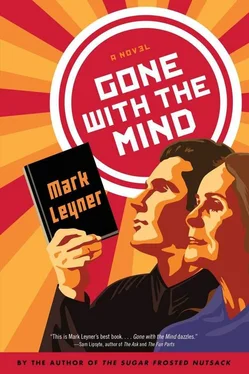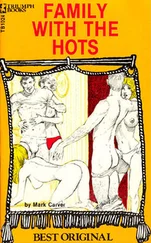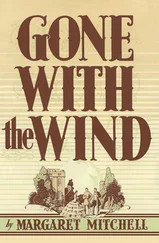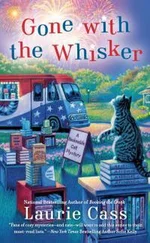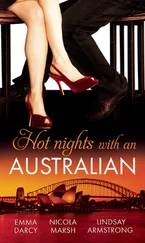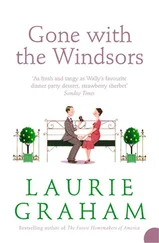You wore that jacket for the party the next day. At the bar mitzvah itself, you wore a regular suit.
Well, anyway…the rabbi leaned over and he whispered something in my ear, but he was so close to my ear that the words were completely garbled, completely unintelligible, it just sounded like static to me. And I said, “What?” And he did the same thing, put his mouth right up to my ear, too close, and said…said who knows what? It was just more distorted static. And I asked him one more time, “What did you say?” But I could see out of the corner of my eye, some guy — I don’t know who it was or what his function was (in my memory’s “eye,” he’s wearing a headset, like the producer on a talk show, but surely that’s an interpolation) — and he was making that circular motion in the air with his arm to indicate that we needed to get things moving here, and the rabbi resumed whatever other tasks he needed to resume in order to finish the ceremony.
So what had he said? Was it English, Hebrew, some version of faux-Japanese gibberish (i.e., a kind of placebo wisdom)? Was it some kabbalistic invocation from the Zohar? Was it my secret mantra? Or some banal platitude I could easily live without? I’ll never know. Was it — given the fact that life is essentially one long BDSM scene — was it my special safe word that I could use to make it all stop? I did ask him, by the way, a couple of weeks later, but he clearly couldn’t remember — I mean the guy did a lot of bar mitzvahs, never mind weddings, funerals, regular sermons, special-event sermons, etc., so I’m not blaming him. But I do feel, to put it simply, that I missed out on my words of wisdom…words of wisdom without which I’ve struggled and floundered perhaps more than I would have if only the words had been audible to me…and I’ve maintained this stubborn, completely quixotic… optimism, I guess you’d have to call it, that someday the mysterious garbled words will spontaneously emerge in perfect, pristine intelligibility from the sedimentary static in which they’ve been buried all these years (sort of the way on crime shows they’re able to “clean” distorted voices in wiretapped phone conversations), but unfortunately this special message will most likely forever remain in the gnawing-enigma file.
Then, in the eighties, I had a job as a waiter at a place in Jersey City called the Summit House. And one of the first tables I ever waited on was a “deuce,” in restaurant lingo, a middle-aged married couple, for whom Friday-night dinner at this particular spot was a custom, a ritual they’d really spruce up for — he always in a carefully pressed polo shirt, seersucker jacket, and dark slacks, she in some sort of floral-print dress, pretty earrings, a pretty tortoiseshell comb in her hair, that sort of thing. The husband pronounced his r ’s as w ’s, a speech defect (sometimes actually a dialect) called r-labialization, most famously portrayed, of course, by Elmer Fudd. So, this exceedingly pleasant, exceedingly soft-spoken guy would, each and every Friday evening, invariably order a “Wob Woy, vewy dwy, a wum and Coke for my wife, the pwime wib, vewy ware, and the bwoiled scwod…and would it be possible for my wife to have that with wice instead of Fwench fwies?” he’d politely ask, each and every time.
I never questioned the authenticity of the order. Yes, it seemed improbable that someone who couldn’t pronounce the letter r would never — just randomly in the course of events — order anything r -less, say, a gin and tonic or a scotch or a steak or a veal chop or spaghetti and meatballs or a chicken pot pie. But I just figured he knew what he liked, knew what his wife liked, and that was that. He seemed like a perfectly decent sort of guy. And I had absolutely no reason to doubt his sincerity. And there’d almost always be dessert — the inevitable “bwead pudding and wed velvet cake”—and at least two “bwandies.” All of which added up to a hefty check for two people, with a potentially substantial tip. So you want to be as accommodating as possible.
One Friday night — this must have been after waiting on them for two or three weeks in a row — the husband asked me some variation on the question, Assuming you don’t want to be a professional waiter all your life, what do you really want to do? And I said that I wanted to be a writer someday. And he said that he and his wife love to “wead.” And I asked, “Who are your favorite writers?” He thought for a moment and he said, “I love Joseph Conwad, Waymond Chandler…and especially Gwaham Gweene.” Now at this point, I remember, I did look around, feeling momentarily that I might be being punked in some way, in some sort of Candid Camera stunt or something, that someone had put him up to this. But again, I really had no reason to think — in fact it seemed a little crazy for me to think — that this seemingly guileless person was in on some sort of elaborate prank that was taking weeks to develop…and who’d want to do this to me anyway? I barely knew any of the other waiters or staff at this place. But still, no r -less writers? No Melville, no Poe, no Hemingway…just “Conwad” and “Gweene”? I mean, c’mon. What are the odds here?
I was just about to head back to the kitchen to pick up one of my other tables’ orders, when the guy said, “I also love music.” I took a deep breath. “Oh,” I said. “What kinds of music?” And again he thought for a moment or two, and then he said, “I love the Wamones, Woxy Music…and especially”—and this he said in a much louder, more declarative voice—“especially Guns N’ Woses.”
And at this moment, I was positive that I heard people sniggering, that there were little contingents of my cohorts huddled in corners of the dining room barely able to control their laughter. And I felt this radiant heat rising from the back of my neck and I felt as if my face must have been bright, bright red with humiliation. And although I never actually saw anyone laughing at me, I knew that they were. Who they were and why they did that to me, I’ll never know. And, yes, it’s possible that a middle-aged man from Jersey City with r-labialization could like “Wob Woys,” “pwime wib,” “Gwaham Gweene,” and “Guns N’ Woses,” but it’s such a remote possibility as to be pretty much inconceivable. Someone…or some people…were behind all this, and their identities will also remain forever in the gnawing-enigma file.
And I also think that this particular event…I guess because I felt so abjectly alone, so on display at that moment, in that dining room full of people (in that particular “food court”)…that this event not only instilled in me a wariness and a hypervigilance and suspiciousness, and maybe even paranoia, that have never abated, but also a weird, masochistic love of precisely this sort of public humiliation. And I’m not saying that’s necessarily a good thing or a bad thing, I’m just saying that that’s probably why we’re all here tonight, and, again, I’m extremely grateful for the opportunity.
The earliest known jokes had no punch lines. They simply consisted of a setup. For example: “A man and a woman exit a garden in shame.” In other words, there were no writers. Today, on the other hand, everyone is a writer. I heard a guy say the other day, “My nuts don’t fit into H&M jeans.” That’s funny, but that doesn’t make him a writer. That would be like calling yourself a gangster because you kill the germs that cause bad breath. To call yourself a writer (and this has absolutely nothing to do with whether you actually write anything or not), you have to imprison yourself in your adolescent bedroom for several years, forcing Kundalini energy up your spinal column until your mind is launched from your body.
Читать дальше
